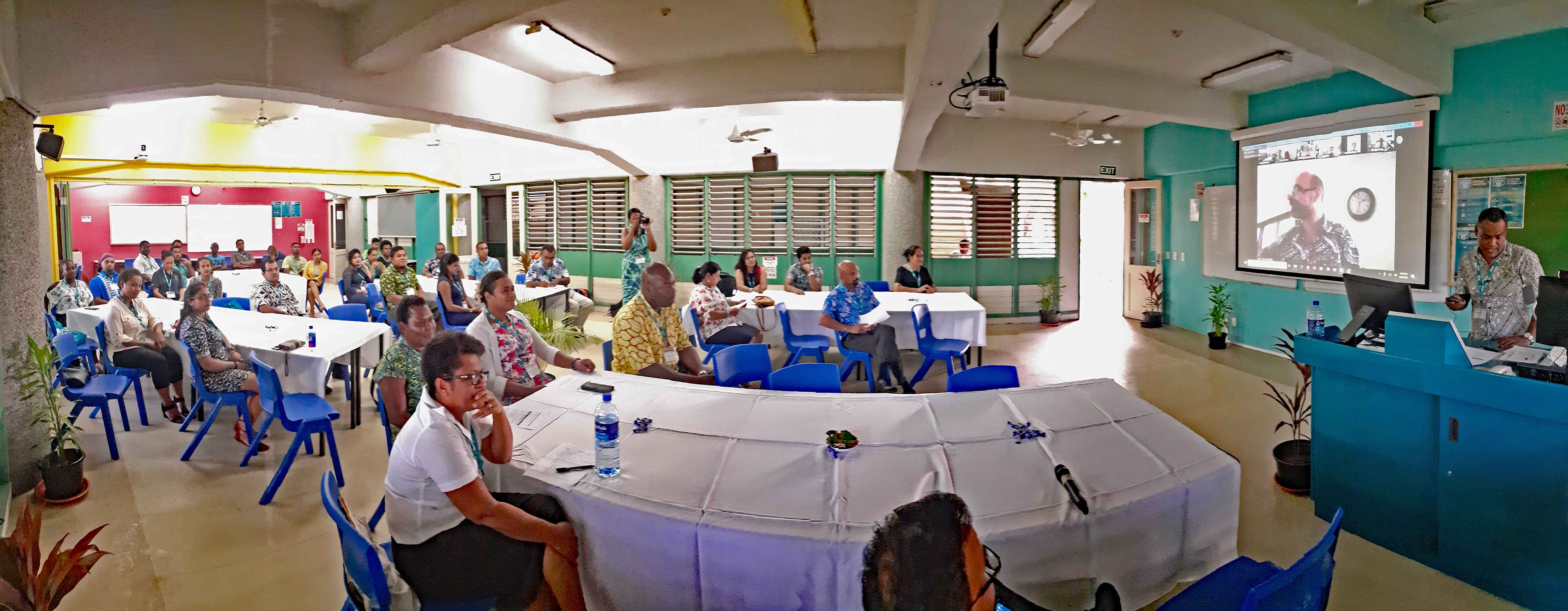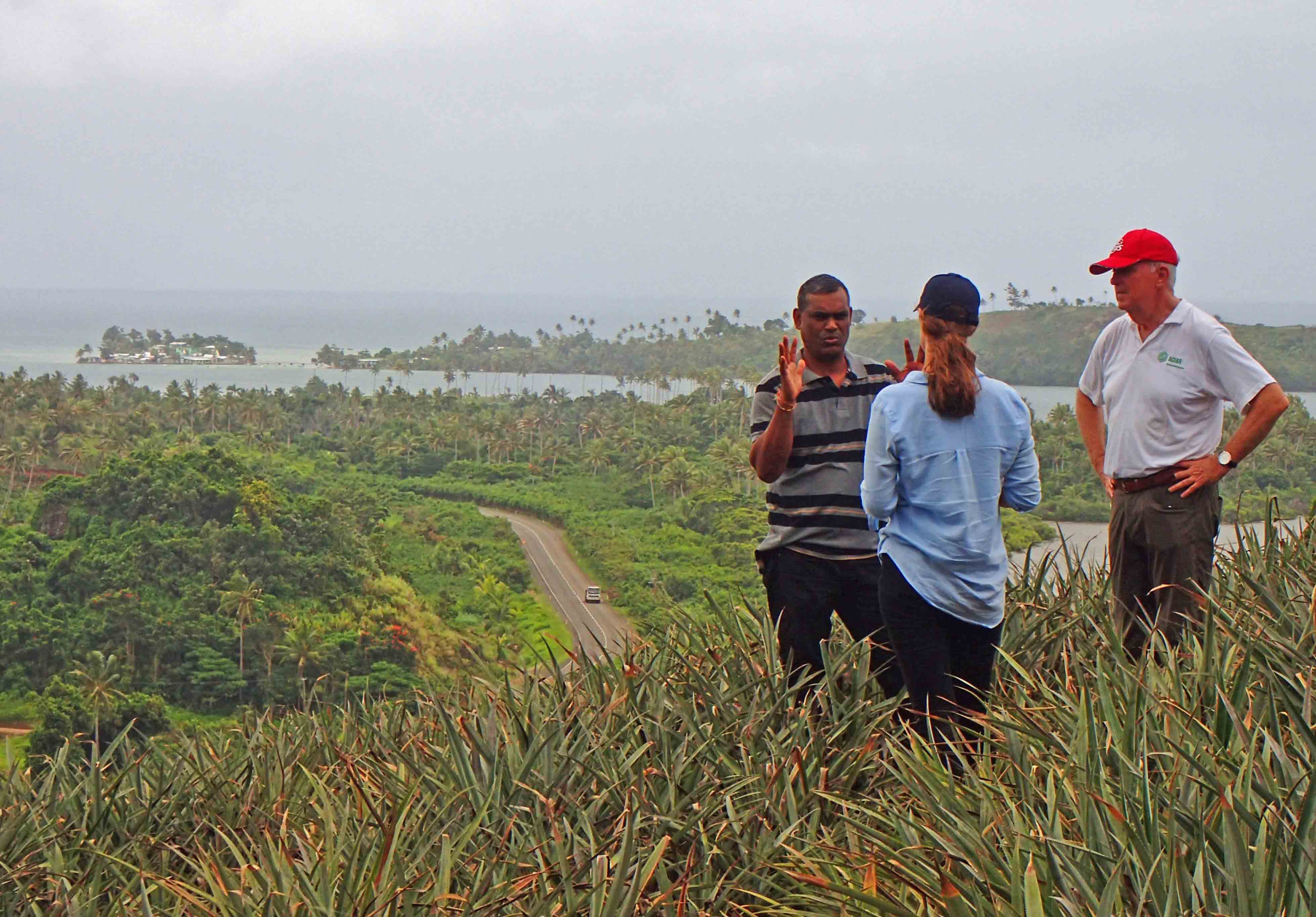Increased commitment to pastoral care and mentoring of students, as well as training of university supervisors, has been key. Both elements have lifted achievement rates of PASS scholars to more than 90% in gaining postgraduate diplomas, master's degrees and PhD qualifications.
Formerly known as the ACIAR-University of the South Pacific (USP) Postgraduate Scholarship Scheme, PASS has included Fiji National University (FNU) as a second partner. PASS is now a multi-pronged program to engage master's and PhD students, strengthen priority areas of research, and build academic networks between Australia and the Pacific region.
Former ACIAR Research Program Manager for Horticulture, Dr Richard Markham, was one of the authors of an external review of the ACIAR-USP scheme, which was used to inform the broader and more ambitious PASS program.
'We've had some really successful people graduating from the program who are doing great work but the review findings have shown us that we can't take positive outcomes for granted,' says Dr Markham.
Success in numbers
Between 2008 and 2020, the ACIAR-USP Postgraduate Scholarship Scheme supported 91 students from 7 Pacific island countries to complete 108 courses for postgraduate diplomas, master's degrees by research or PhDs in a range of agricultural fields.
From a low in 2012 when completion rates at USP were sitting at around 10% for PhDs and 15% for master's degrees, achievement rates among ACIAR scholarship awardees have jumped to 93% for postgraduate diplomas, 94% for master's degrees and 80% in gaining PhD qualifications.
'A graduate officer was appointed for the sole purpose of administering the scholarships within the university, supporting and encouraging the scholars, and the program also focused on building the skills of academics to supervise postgraduate research,' says Dr Markham.
'Rather than ACIAR administering funds, student research grants are managed via their university. The research funds pay for travel to field sites for data collection, data analysis costs and research consumables. Funds are approved and overseen by the universities.'
Long-term benefits
Ms Joy Hardman, ACIAR Capacity Building, says a thriving agricultural research education system will help sustain the careers of Pacific region researchers, with the hope they can continue to contribute to solving agricultural research problems within their own Pacific context over the longer term.
'There's a high level of ag researchers exiting the Pacific islands region so we hope to make the proposition of staying more attractive and encourage peer-to-peer support networks, including international networks, through academic research centres like the Australian Centre for Pacific Islands Research (ACPIR) at the University of the Sunshine Coast (USC) in Queensland,' Ms Hardman says.
ACPIR provides additional support to PASS scholars and academic staff in the form of professional development, peer-to-peer learning, research collaboration and higher degree research supervision training. Student work placements and career development are included under the program to build ongoing industry connections.
ACIAR connectivity
'It requires working in partnership to offer scholarships in developing countries to meet the requirements of participating universities and operate in complex environments. The unique factor in PASS is that the postgraduate student must be connected to an ACIAR research project in the region and address a research theme or question identified by the project,' says Ms Hardman.
'That gives connectivity for the scholar to the whole project team - both Pacific and Australian project members.'
The pandemic has both constrained and enabled the PASS program. Working online has enabled monthly online student supervisor progress meetings. Scholars across the region also have access to a large number of seminars and workshops and in general it has improved communication. However, there has been a lack of face-to-face time to build even stronger rapport and establish friendships across the oceans.

'It's our first year offering scholarships at FNU and together we are undertaking an opportunities analysis of the university's forestry curriculum, with the majority of the 5 FNU scholarships in forestry. Clustering scholarships around a research theme and updating curriculums can strengthen a discipline within a university,' says Ms Hardman.
'At USP, where the ACIAR program is the university's longest and most successful scholarship scheme, we will work together to strengthen the soils faculty and make that field of research a priority when selecting students for scholarships.'
Dr Markham says PASS offers opportunities for mutual learning and more strategic planning between Australian and Pacific region universities, governments and business to offset the challenges facing the region's small, scattered economies.
'One of the gratifying things is that PASS graduates have become very enthusiastic about solving issues at home. By linking them up with viable government-funded research projects, they actually see a future and a career and build professional networks,' he says.
Skills boosted by mentoring and networks
Dr Salesh Kumar grew up on a cattle and sugar cane farm in Tavua, in Fiji's Western Division, and gained his master's at Fiji National University (FNU). He then successfully applied for a scholarship under the ACIAR PASS program, graduating with a PhD in 2015.
Dr Kumar is an Assistant Professor, Agricultural Economics and Agribusiness at the College of Agriculture, Fisheries and Forestry (CAFF) at Fiji National University. As the Head of School, Agriculture and Forestry at CAFF, he is passing on his skills and enthusiasm to a new generation of agriculture students.
The President of the Fiji chapter of ACIAR alumni is quick to acknowledge the 'prestigious' scholarship as a key contributor to his success.
'The scholarship provided formal training and informal networking opportunities, enabled me to publish my work in local and international journals, and gave me the skills to manage budgets and people,' says Dr Kumar.

'Because it's attached to an ACIAR project, students benefit from networking with the project leader and other research scientists from the Pacific and Australian faculties, such as the University of Queensland, University of the Sunshine Coast (USC) and the University of Adelaide.
'You get to really experience how applied research is conducted in the field, and you are given the opportunity to gain in-depth knowledge in specific subject areas through access to the libraries of other universities or through travelling to Australia for short courses.'
To make the scholarship journey successful, a student needs to take the time to find the right supervisor who is willing to help not only as an academic advisor but also as a mentor and friend, says Dr Kumar.
He teamed up with his supervisor, Professor Steven Underhill, Director of the Australian Centre for Pacific Islands Research (ACPIR) at USC, and another researcher to produce his PhD on 'Post harvest physical risk factors along the tomato supply chain: a case study in Fiji', which provided a baseline for postharvest vegetable research in the region.
Dr Kumar describes Professor Underhill as 'exemplary, and very supportive'.
'Professor Underhill changed my way of thinking. He was there to support me, respond to my emails, give advice and visit every 2 to 3 months over the 3 years of my scholarship, and he is still my mentor,' says Dr Kumar.
'As an administrator I'm trying to connect the FNU staff with locals through collaborations in a number of ACIAR projects, from a coconut project with the University of Queensland, to studying the value chain of sheep and goats with the University of Sydney, and a number of completed COVID-19 projects with USC. It's great.
'I'm very grateful to the ACIAR Capacity Building team who have worked to help us. Last year we organised a symposium to network with locals and talk about results of research, and that networking helps us all to move forward.'
Dr Kumar says he expects greater retention of agricultural researchers through the provision of PASS scholarships and sees the potential to involve organisations outside the universities, such as the Scientific Research Organisation of Samoa and the Pacific Community.
'These organisations know the knowledge gaps and where research is needed so we can involve Pacific islanders and government bodies like Fiji's Ministry of Agriculture to identify their research expectations and narrow it down to get to the crux of what we should be doing,' says Dr Kumar.
Key points
- The ACIAR Pacific Agriculture Scholarships and Support (PASS) program supports Pacific islander students to gain master's and PhD qualifications.
- With the support of the PASS program, the completion rates for master's and PhDs are 94% and 80% respectively.
- The program is helping to build and retain agricultural, forestry and fisheries research expertise and networks in the Pacific region.






